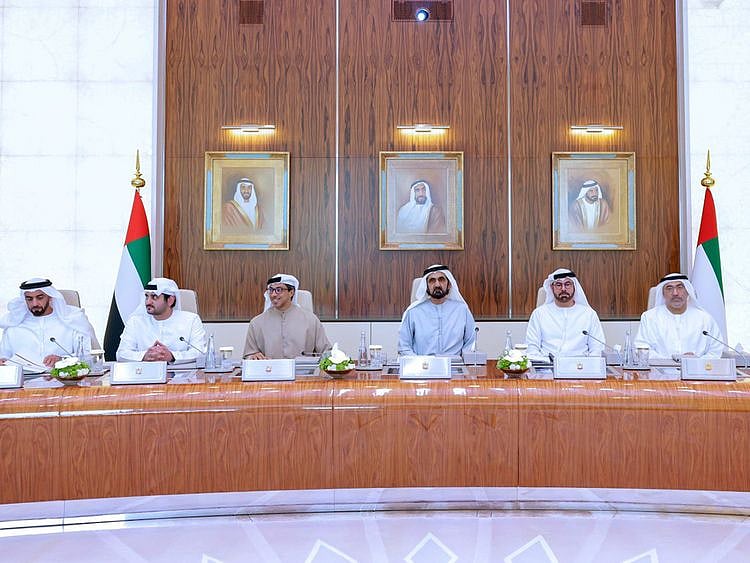Ministry of Investment formed in UAE, Mohammed Hasan Al Suwaidi named minister
Ministry to ensure UAE remains an active investment hub in the region

Abu Dhabi: His Highness Sheikh Mohammed bin Rashid Al Maktoum, Vice-President and Prime Minister of the UAE and Ruler of Dubai, on Monday approved the establishment of a Ministry of Investment at a Cabinet meeting.
Mohammed Hasan Al Suwaidi was appointed as the Minister of Investment, Sheikh Mohammed said.
“The ministry has been established with an aim to develop the UAE’s investment vision, stimulate the investment environment and enhance the competitiveness of legislation to ensure the UAE remains a global investment hub and an active player in the movement of international investment,” Sheikh Mohammed said in a tweet.
The Vice-President also approved an updated national energy strategy to cope with rapid changes in the energy sector, and increase the contribution of renewable energy three folds within the next seven years.
National Hydrogen Strategy
A National Hydrogen Strategy was also approved at the Cabinet meeting, with the aim to strengthen the UAE's position as a leading producer and exporter of low-carbon hydrogen within the next eight years.
Additionally, a specialised national centre for research and development on the hydrogen sector will be established to further drive advancements in the field.
Also Read
Sheikh Mohammed launches fifth phase of Mohammed bin Rashid Al Maktoum Solar ParkSheikh Mohammed issues decree on promotion, retirement of military personnel in DubaiUAE: Mohammed bin Rashid establishes board of trustees for Dubai Appreciation Award for Community ServiceUAE: Sheikh Mohammed bin Rashid calls high school topper to congratulate her and all graduatesSheikh Mohammed also approved the appointment of Sheikha Maryam bint Mohamed bin Zayed Al Nahyan as Chairperson of the National Centre for Educational Quality Enhancement.
The centre will focus on establishing an evaluation and monitoring system for the education sector in the country. It will closely monitor the quality of educational outputs and set targets and benchmarks for all levels and types of education.
“We are optimistic about Sheikha Maryam joining the educational system team in the country under the supervision of Sheikh Abdullah bin Zayed, and we are optimistic about distinguished national educational outcomes,” Sheikh Mohammed said.
Licence for self-driving vehicles
The Cabinet also approved the first licence of its kind for self-driving vehicles to run on the country’s roads. The licence has been granted to WeRide company, which will test different types of autonomous vehicles.
The Cabinet also approved a national policy for electric vehicles, which includes building a network for electric vehicle charging devices, regulating the EV market, and stimulating related industries to ensure the reduction of emissions, reduce energy consumption, among others.
“As the world rapidly evolves, so do our patterns of mobility. In the coming years, we anticipate significant changes in the way people live and move within the country. The well being, comfort, and quality of life of our citizens and residents will remain top priority on our government’s agenda,” Sheikh Mohammed said.
The Cabinet also approved the establishment of the Financial Stability Board and issued a federal law to that effect. The law aims to strengthen and protect financial stability in the country, monitor the risks associated with it and deal with financial crises.
The council is also tasked with developing proactive measures to mitigate the risks faced by the economic, financial, and monetary systems in the country. These measures aim to prevent the systems from being exposed to elevated levels of risk. By implementing these measures, the council seeks to ensure the stability and resilience of the country's economic framework and safeguard it against potential threats and vulnerabilities.
“Today, the UAE is a global financial hub that enjoys the confidence of tens of thousands of financial institutions and millions of investors around the world, and our goal is to strengthen, consolidate and maintain this trust in order to serve our supreme national economic interests,” the Vice-President said.
The UAE has made significant amendments to the anti-human trafficking law, reflecting its commitment to combating the crime. The amendments include stricter penalties for offenders and the introduction of comprehensive support services for victims.
Victims will have access to educational assistance and safe measures for their return to their home countries. Furthermore, the amendments criminalise any form of incitement to commit trafficking crimes and impose stronger penalties on perpetrators.
“Our nation's humanitarian and civil stance is built upon unwavering principles and values that have remained constant since its establishment,” the Vice-President said.
Sign up for the Daily Briefing
Get the latest news and updates straight to your inbox
Network Links
GN StoreDownload our app
© Al Nisr Publishing LLC 2025. All rights reserved.